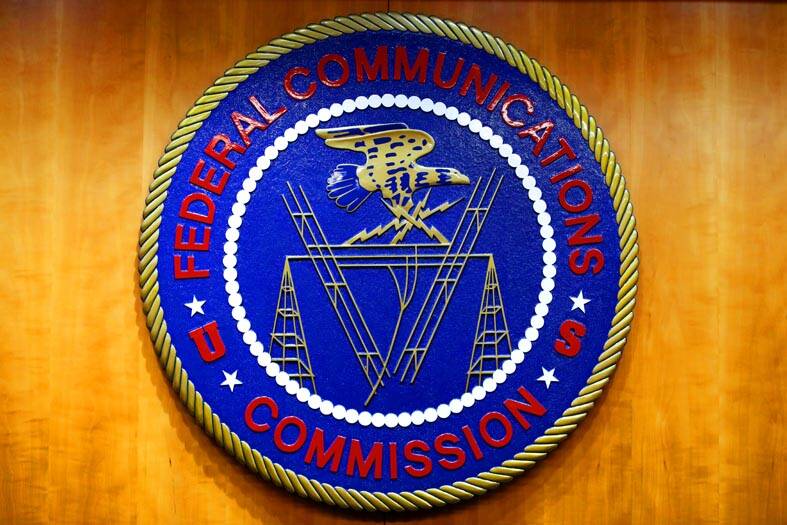The US Federal Communications Commission (FCC) on Thursday ordered the US units of China Telecom Corp (中國電信), China Unicom Hong Kong Ltd (中國聯通) and China Mobile Ltd (中國移動) to discontinue fixed or mobile broadband Internet operations in the US.
The FCC said it was requiring the Chinese carriers to discontinue services within 60 days of the effective date of the net neutrality order approved on Thursday.
The order also applies to Chinese telecom Pacific Networks Corp (太平洋網路) and its wholly owned subsidiary ComNet (USA) LLC.

Photo: AP
The commission previously had barred the companies from providing telecommunications services and those decisions were upheld by US courts.
FCC Chairwoman Jessica Rosenworcel on Thursday said the commission had evidence that Chinese telecoms were providing broadband services in the US.
The FCC cited national security concerns in revoking or denying Chinese companies the right to provide US telecommunications services.
Chinese telecom firms are “subject to exploitation, influence and control by the Chinese government,” the agency said.
The Chinese telecom companies did not immediately respond to requests for comment.
FCC Commissioner Geoffrey Starks said China Telecom’s Web site shows that the company operates 26 so-called Internet “Points of Presence” (POPs) in the US and offers colocation, broadband, IP transit and data center services.
The FCC cited national security concerns about Chinese access to POPs typically located within data centers.
“They are interconnecting with other networks and have access to important Points of Presence and data centers,” Starks said, urging “a closer look at the threats that adversarial providers pose to our data and data centers.”
The FCC since 2022 has been studying vulnerabilities that it says threaten the security and integrity of the Border Gateway Protocol, central to the Internet’s global routing system.
This is the latest action by Washington to restrict Chinese telecom carriers including on undersea cables handling Internet traffic.
The FCC previously barred approvals of new telecommunications equipment from China’s Huawei Technologies Co (華為), ZTE Corp (中興) and other companies saying they pose “an unacceptable risk” to US national security.

SECURITY: As China is ‘reshaping’ Hong Kong’s population, Taiwan must raise the eligibility threshold for applications from Hong Kongers, Chiu Chui-cheng said When Hong Kong and Macau citizens apply for residency in Taiwan, it would be under a new category that includes a “national security observation period,” Mainland Affairs Council (MAC) Minister Chiu Chui-cheng (邱垂正) said yesterday. President William Lai (賴清德) on March 13 announced 17 strategies to counter China’s aggression toward Taiwan, including incorporating national security considerations into the review process for residency applications from Hong Kong and Macau citizens. The situation in Hong Kong is constantly changing, Chiu said to media yesterday on the sidelines of the Taipei Technology Run hosted by the Taipei Neihu Technology Park Development Association. With

CARROT AND STICK: While unrelenting in its military threats, China attracted nearly 40,000 Taiwanese to over 400 business events last year Nearly 40,000 Taiwanese last year joined industry events in China, such as conferences and trade fairs, supported by the Chinese government, a study showed yesterday, as Beijing ramps up a charm offensive toward Taipei alongside military pressure. China has long taken a carrot-and-stick approach to Taiwan, threatening it with the prospect of military action while reaching out to those it believes are amenable to Beijing’s point of view. Taiwanese security officials are wary of what they see as Beijing’s influence campaigns to sway public opinion after Taipei and Beijing gradually resumed travel links halted by the COVID-19 pandemic, but the scale of

A US Marine Corps regiment equipped with Naval Strike Missiles (NSM) is set to participate in the upcoming Balikatan 25 exercise in the Luzon Strait, marking the system’s first-ever deployment in the Philippines. US and Philippine officials have separately confirmed that the Navy Marine Expeditionary Ship Interdiction System (NMESIS) — the mobile launch platform for the Naval Strike Missile — would take part in the joint exercise. The missiles are being deployed to “a strategic first island chain chokepoint” in the waters between Taiwan proper and the Philippines, US-based Naval News reported. “The Luzon Strait and Bashi Channel represent a critical access

Pope Francis is be laid to rest on Saturday after lying in state for three days in St Peter’s Basilica, where the faithful are expected to flock to pay their respects to history’s first Latin American pontiff. The cardinals met yesterday in the Vatican’s synod hall to chart the next steps before a conclave begins to choose Francis’ successor, as condolences poured in from around the world. According to current norms, the conclave must begin between May 5 and 10. The cardinals set the funeral for Saturday at 10am in St Peter’s Square, to be celebrated by the dean of the College